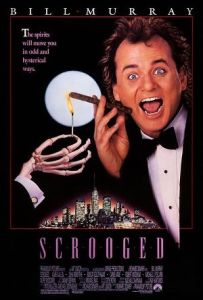- Year: 1988
- Director: Richard Donner
- Starring: Bill Murray, Karen Allen, Alfre Woodard
I have to admit I’m excited, because today we’re going to be talking about one of the greatest films of all time. We’ll be looking at a film where Bill Murray plays a sarcastic jerk who works at a TV station, who on the eve of a holiday is convinced to change his ways thanks to a supernatural means.
But enough about Groundhog Day. Of all the modern day retellings of A Christmas Carol, Scrooged is easily the most famous. Updated versions of the tale make perfect sense, as we’ve all wondered what Ebenezer Scrooge would look like today.

Actually, our Scrooge here is Frank Cross, the president of IBC (apparently none of the real networks had a sense of humor), and to his credit the youngest network president in history. Setting the story at a TV station instead of a counting house does allow for some clever satire, especially in the network’s Christmas Eve lineup. We get Lee Majors fighting off intruders at the North Pole, Robert Goulet singing “Silver Bells” while rowing on a river and being chased by an alligator, and a sitcom called Father Loves Beaver. Well, the first two are clever.
IBC’s big Christmas Eve program is a live production of A Christmas Carol, narrated by John Houseman and starring Buddy Hackett as Scrooge, Jamie Farr as Marley, and Mary Lou Retton as Tiny Tim. Beyond the obvious Mary Lou Retton miscasting, Buddy Hackett playing Scrooge is a shout-out to all the perfectly fine actors who were just not right to play Scrooge. (For those who aren’t familiar with him, Buddy Hackett was a goofy comedian, essentially a poor man’s Lou Costello.) It may be unintentional, but even Jamie Farr would be a much better choice to play Scrooge, and he’s in the same cast!
Of course, Frank finds his team’s Christmas ad far too charming and safe, so he presents his own where he essentially tries to scare people into staying home and watching TV. Of course, maybe we’d take it more seriously if it wasn’t written in Monty Python font.
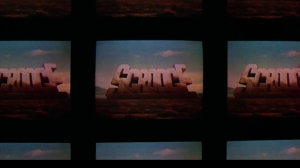
I find it interesting that Scrooge, a man who hated being bothered by people, is re-imagined as the president of a TV station, someone whose entire job revolves around working with people and knowing what people want to see. It’s a comedy, so it’s understandable that Frank will be more of a jerk than your normal Scrooge, but this guy is so verbally abusive that you don’t believe he’s a real person. Don’t get me wrong, no one plays a condescending prick better than Bill Murray, but he takes it way too far here. At times it feels like Scrooged is going for absurdist humor in just how over-the-top Frank is, but the rest of the story is much too grounded to make that work.
Alright, so maybe this is just an exaggerated persona that Frank adopts to be respected by his underlings—he is the youngest network president after all. Well, that’s thrown out the window when he steals a cab from an old lady to get to his Humanitarian of the Year dinner on time. Scrooge was a sad man who turned the world away, but Frank Cross seems to thoroughly enjoy being a horrible person.
Scrooged also feels the need to add a lot of supporting characters who don’t really add much to the story. In a somewhat superfluous subplot, Frank’s boss Preston Rhinelander (Robert Mitchum) has hired Brice Cummings (John Glover) to assist him, and of course Brice is after Frank’s job. There’s also this weird running joke where Rhinelander insists of more cat-friendly programming, which all leads up to him watching TV with his cats. Seriously, that’s the punch line you were building to? It feels very strange that immensely talented actors like John Glover and especially Robert Mitchum were cast in these throwaway parts. Bob Cratchit is divided into two characters, the first being Grace Cooley, played wonderfully by Alfre Woodard. This could have easily come off as a cliched overworked secretary, but Woodard brings so much humanity to it that you forget it ever was a stock character. Unfortunately, there’s another Cratchit in this film, a meek yes-man named Eliot Loudermilk portrayed by…
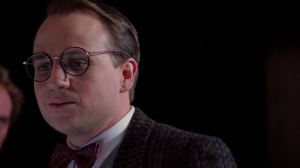
Look, there are a lot of things that date this movie, whether it be the pop culture references, Berlin Wall remarks, or Mary Lou Retton (albeit that one’s intentional), but casting Bobcat Goldwhait may be the most obvious. Maybe I’m the only one who can’t stand this guy, but is he ever annoying. He just seems to feel the need to yuk it up in every shot, and I mean every single shot. We get the feeling that Eliot Loudermilk is the kind of guy who has been just going with the flow for a long time, letting Frank Cross push him around, but today he’s going to take a stand. This is a tough kind of character to play, but to see it done well, just look at Crispin Glover in Back to the Future. George McFly is a similarly nebbish character who has been letting people push him around for his whole life, but there’s still more buried deep down. George could have been just another nerdy loser, but Glover played him in a way that he was three-dimensional. Bobcat Goldwhait just plays up the stereotype without an ounce of humanity.
All of these characters and plots take a long while to develop, and the first act of the movie feels really tedious. After accepting his award, Frank is visited by his old boss and mentor Lew Hayward (John Forsythe) who warns him to change his ways. After Frank refuses to believe he’s real, Lew drops him out of a window. Frank ends up in his office, having unknowingly dialed his ex-girlfriend Claire (Karen Allen).
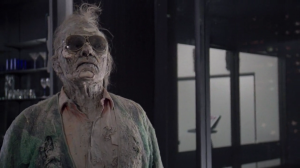
This scene just does not land (no pun intended). Frank is way too relaxed in response to seeing Lew’s ghost. Sure, he tries to shoot him and still says he doesn’t believe, but his expression seems to be one of “Sure, whatever.” Hayward’s dialogue does not sound natural, mixing lines straight out of Dickens with his laid-back conversational tone. I’m pretty sure Murray and Forsythe did record their parts in the same studio, but it sure feels like they didn’t. Plus, I never got why Frank was thrown out of a window, except perhaps to say, “Look, we’re edgy, bet you wouldn’t see this in another film.”
Since our Scrooge knows the story of A Christmas Carol, there are some fun things they can do with the way it’s presented. Frank is told the first ghost will arrive at 12 noon on Christmas Eve, so during lunch with his boss, he keeps wondering which of the people in the room is the ghost. That’s actually pretty clever. Eventually, after extinguishing a man he thinks is on fire, Frank runs outside and hails a taxi.
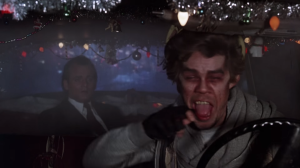
Of course, the taxi driver (David Johansen) is the Ghost of Christmas Past, and here it finally feels like the movie is picking up. Johansen is hilarious in the part, driving like a maniac just to scare Frank out of his wits. To be fair, there are plenty of versions of Christmas Past who seem to relish in freaking Scrooge out a little, and since Scrooged is a comedy, Johansen’s ghost turns it up all the way.
Frank is whisked away in the cab to 1955, when he was just four years old. I suppose 1955 was just the year to go in ’80s time-travel comedies. Frank as a young child watched a lot of TV, mainly because his butcher father (Brian Doyle-Murray) was as much of a rude, uncaring, completely-unbelievable-as-a-person jerk as he would go on to be. What was Frank’s Christmas gift as a four year old? A five pound cut of veal. His father tells him that if he wants a toy, he should get a job. Once again, this is so far-fetched in a movie that seems to be set in the real world, that it is neither believable or funny.
Even though Johansen’s Christmas Past is the most obnoxious and sarcastic version ever put to screen, he’s also perhaps the most kind. Seriously. When Frank tears up after seeing his mother, Christmas Past offers him his handkerchief, with only a smidgen of “I told you so.”
There’s a great bit where Frank tries to tell Christmas Past about his accomplishments as a child, but he is immediately called out for simply recounting plots of television shows he watched. The timing between Johansen and Murray is pitch perfect in these scenes, which may stem from the fact that they were friends in real life. Perhaps the film’s funniest exchange also comes from this scene.
- Christmas Past: Let’s face it Frank—garden slugs got more out of life than you did.
- Frank: (laughs) Name one.
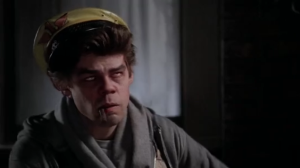
I won’t say that all of the film’s best jokes come from the Christmas Past sequence, but the film is definitely lacking in humor before and after David Johansen is on screen. There are even some clever background jokes in this sequence, like the ghost’s cab being from the Belle Cab Company.
After Frank is done seeing the past, he goes to visit Claire at the shelter where she works, meeting some homeless people who are convinced he’s Richard Burton, which is another joke that really doesn’t go anywhere. He also angers Claire by telling her she should fire all her incompetent volunteers and blow off the homeless to spend time with him.
Christmas Present is also a lot of fun, played here by the always delightful Carol Kane. She’s portrayed as sort of a psychopathic fairy, who is both bubbly and someone who gets enjoyment out of hitting Frank, even clocking him with a toaster at one point.
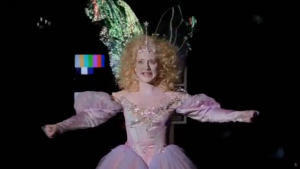
With a lot of actors, this might not have been too funny, but when the physical comedy is coming from someone with the voice of Carol Kane, it works great. In a great scene with Grace, it’s revealed her husband died a few years ago, a fact Frank was totally oblivious to, and that her son Calvin hasn’t spoken since. This is a really smart update on the Tiny Tim character. Sure, they could have just made him a kid with cancer, but like Tiny Tim in the book, he has a condition that with the right time and money could be fixed, but, due to the circumstances at the moment, cannot be. Plus, the silent character’s name is Calvin Cooley, which is perhaps the only Calvin Coolidge joke ever made in a movie.
In the film’s most heartbreaking scene (yes, even more than the future scenes), Frank finds Herman, one of the homeless men he had talked to earlier, frozen to death. He shouts at Herman’s dead body,” Why didn’t you stay at Claire’s? Why didn’t you stay with Claire? She would have taken care of you!” Murray’s acting in this scene shows truly how much he is capable of. He’s shouting at Herman on the verge of tears, but he is really shouting at himself, revealing how much he hates himself for the choices he’s made in life.
To be fair, the tone in the past, present, and future sequences is pretty consistent. The ghosts and Frank bring most of the humor to the scenes while the visions are pretty straightforward. Funny things happen, especially in the past scenes, but, the scene with Frank’s father aside, they still feel like real life. It’s the stuff going on in between that really detracts from the film.
Another hilarious scene takes place when Frank sees the Ghost of Christmas Future in an elevator and freaks out, only to realize it’s the actor playing the ghost in the telecast.
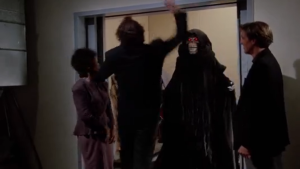
How bad can Frank’s future be though really? I mean, in the present, Bobcat Goldwhat has come back into the movie.
And he’s got a gun.
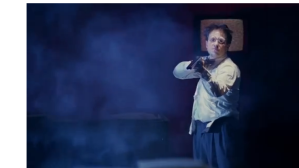
Except in the darkest of comedies today, I don’t think a disgruntled employee coming back and shooting up the place could be played for laughs. To be fair, no one actually dies, but not only is it unfunny, it’s completely unnecessary except to get Frank into an elevator to meet the real Ghost of Christmas Future.
Under Christmas Future’s hood is a television set which shows the scenes of the future. This is just a small innovation, but it’s incredibly creative. Frank is shown scenes of both near and distant future, and these emphasize how much of a negative effect he’s had on people. Calvin doesn’t die, but he doesn’t recover from his muteness and is locked up in a padded room where his mother can only visit him briefly. In an even darker twist than we usually see, Claire has taken Frank’s advice and has devolved into a socialite who cannot stand the poor. Then there’s this scene of Wendy, Frank’s sister-in-law mourning someone who has passed.
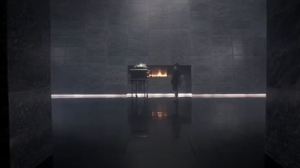
Of course, we’re expecting it to be Frank, but Frank assumes it’s James, his brother and this film’s equivalent of Scrooge’s nephew Fred. For a short moment, I actually thought Scrooged might go an incredibly mature route and have it be James in the casket. It would keep with the theme of showing all the people’s lives Frank has screwed up, and it would have been an interesting twist on the normal story, but nope, it’s Frank. He then tries to stop the casket from going into the cremation chamber, but he’s sucked into the flames with it.
Why do so many adaptations from this period have Scrooge get sucked into his own fiery grave? Okay, it was actually a little haunting in the Disney version of all things, but in the dark comedy that is Scrooged, it’s neither scary or funny.
Speaking of not funny, Frank goes back to his office where he convinces Eliot to hold the control room at gunpoint so he can interrupt his own version of A Christmas Carol and give a speech about Christmas spirit. As far as 1988 Christmas movies involving hostage situations go, I suppose it’s the second best. Anyway, everyone embraces the spirit, Calvin comes up with Frank, speaks Tiny Tim’s famous line, and everyone joins in a sing-along of “Put a Little Love in Your Heart.” The song is cheesy, but in a good way, and seeing John Houseman narrating a few lyrics makes it all worth it.
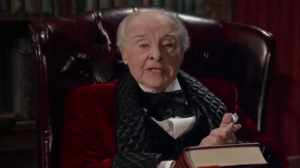
This final scene raises so many questions. If the production was almost over anyway, why didn’t Frank just wait until it was and then come out and wish everyone a Merry Christmas? Couldn’t he give a speech then anyway and not upset the network executives? Shouldn’t he still do something about the gunman who came in and tried to kill him? Why does he see Herman as a ghost? He still died? That’s pretty dark. Or was he a ghost the whole time? Let’s go with that… not because I believe it, but because it’s way too dark otherwise.
Scrooged is a really mixed bag. Not surprisingly, director Richard Donner clashed with Bill Murray throughout. Bill Murray has gone on record saying that the script was much better than the finished film would suggest, and that makes sense. There are moments of sheer brilliance scattered throughout, but there are also so many scenes that could have been cut and nothing would have been lost. Let’s check out the final score.
Story (18/30 Points)
It takes forever to pick up, but once it does, there are some really great moments. Frank yelling at the homeless man about staying with Claire is an astonishing scene, and having Claire become an apathetic person in the future adds a tragic bent. Unfortunately, way too much of the story is centered around the workers at IBC, and their story just isn’t all that fascinating.
Scrooge (15/30 Points)
Bill Murray as a modernized Ebenezer Scrooge sounds great, and while he has some great moments, he’s such a horrible person at the beginning that you don’t believe he’s real. He doesn’t come across as someone who would even take a chance at redemption if it was offered. If you want to see Bill Murray going through a believable change, watch Groundhog Day.
Ghosts (8/10 Points)
David Johansen is spectacular as the “New Yawk” Ghost of Christmas Present. His scenes are the ones I could go back and watch over and over. Carol Kane definitely makes the most of her screen time, and Christmas Future is pretty creepy and has a cool design. Lew Hayward is the only reason this category doesn’t get a perfect score.
Bob Cratchit (5/10 Points)
Alfre Woodard’s Grace Cooley is one of the best characters in the film—hardworking, caring, and still somewhat upbeat. Eliot Loudermilk, on the other hand, is unequivocally the worst part of this film. Imagine the film without him. Would all that much really have to change?
Supporting Characters (3/10 Points)
So many great actors are wasted in this movie. Why is Robert Mitchum here? His character is pointless and doesn’t have one funny line. Karen Allen’s Claire is fine, but it’s nothing we haven’t seen before. I do have to admit I enjoy the cameos of Buddy Hackett, Jamie Farr, and Mary Lou Retton in the badly miscast Scrooge. Hackett’s bad accent alone is worth the price of admission.
Experience (5/10 Points)
Some jokes will having you laughing out loud, while others will make you shake your head. The mood is inconsistent, but it does hit some really good high notes.
Final Score: 54%
A lot of critics didn’t like Scrooged for being too dark, but that’s not my problem at all. A Christmas Carol is definitely a dark story, and I would love to see a really great dark comedy version made. While this is not that version, it is definitely worth watching once for the stuff that’s good. I just don’t think it’s one I’ll be watching every year.
Next up, we’ll be looking at another comedic take, The Muppet Christmas Carol.
